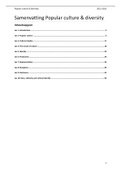Popular culture & diversity 2021-2022
Samenvatting Popular culture & diversity
Inhoudsopgave
Les 1: Introduction .......................................................................................................................................... 2
Les 2: Popular culture ..................................................................................................................................... 5
Les 3: Cultural studies ................................................................................................................................... 11
Les 4: The circuit of culture ........................................................................................................................... 18
Les 5: Identity ............................................................................................................................................... 24
Les 6: Production .......................................................................................................................................... 29
Les 7: Representation ................................................................................................................................... 33
Les 8: Reception ............................................................................................................................................ 39
Les 9: Disclosure ........................................................................................................................................... 45
Les 10: Race, ethnicity and cultural identity .................................................................................................. 50
1
,Popular culture & diversity 2021-2022
Les 1: Introduction
1. Introduction
The aim of this course is to take popular culture seriously and to investigate the relationship between
popular culture, media and diversity. We are going to analyse popular culture through a cultural studies
approach and theoretical texts.
2. Why popular culture & diversity?
Popular culture is all around us, we interact with it constantly. It’s a reflection of and influence on
society. Interaction with social issues and current affairs.
ð We are going to critically engage with production, text & reception of popular culture.
2.1. Exploring the topic
What are examples of popular culture?
• Popular culture is often media culture à focus of course
What is culture?
• Difficult: culture on its own is a broad field and consists of processes of meaning production
and circulation.
High vs. low culture: hierarchical
• Culture is linked to ‘high culture’ vs. popular culture that is linked to ‘low culture’
2.2. What is popular culture?
There are different elements :
• Large audience, many people like it
• Often low culture
• Industrially produced
• It is the culture of common people
• Folk culture: from the past (so it is authentic ?)
Think of concrete examples. Which ones do you like, which ones don’t you like? Why is one better than
the other? What are relevant criteria to judge this? How would you define quality?
ð Findings : tastes differ from one person to another and criteria to judge this is hard to define. There
are often also social pressures that can be a reason why we like some examples of PC more than
others.
ð There is also a certain hierarchy in quality
Think about music genres. How would you classify them?
• Criteria:
• Authenticity
• Commercial
Think about television genres. How would you order them? Which criteria do you use?
• Information, education
• Entertainment, fun
2
,Popular culture & diversity 2021-2022
• What’s good?
• There are no fixed criteria
• It is not the same for everyone: taste
• It is not completely individual: social aspect (it may not be completely individual)
• It is not natural: it is learned, what can be accepted as good
• It is not the same everywhere: it can be culturally specific
• It is not the same all the time: historically specific
There are often discussions about the quality of things.
Think of TV series: which ones do you think are ‘good’?
• Criteria: often from other media (filmic, timeless, original)
• Soaps can also be good:
• Production: well-made
• Text: according to genre
• Audience: like it
à no absolute criteria, but possible to discuss and argue about ‘quality’
• There is a blurred distinction between high/low
• Popular culture in high culture
• High culture in popular culture
• High culture is not exclusively high class
• Less stigma around popular culture
• But:
• One way process?
• Daily uses of hierarchy
2.3. Popular culture and politics?
3
, Popular culture & diversity 2021-2022
2.4. How does popular culture relate to identity? Different layers of identity?
• Personal ID: sense of self
• Social ID: connecting groups
“We enjoy popular music because of its use in answering questions of identity: We use pop songs to
create for ourselves a particular sort of self-definition, a particular place in society. The pleasure that
pop music produces is a pleasure of identification—with the music we like, with the performers of that
music, with the other people who like it”. (Frith, 1987, p. 140)
2.5. Framing diversity
2.6. Intersectionality (kruispuntdenken)
Intersectionality promotes an understanding of human beings as shaped by the interaction of different
social locations (e.g., ‘race’/ ethnicity, indigeneity, gender, class, sexuality, geography, age,
disability/ability, migration status, religion). These interactions occur within a context of connected
systems and structures of power (e.g. laws, policies, state governments and other political and
economics unions, religious institutions, media). Through such processes, interdependent forms of
privilege and oppression shaped by colonialism, imperialism, racism, homophobia, ableism and
patriarchy are created. (Hankivsky, 2014)
At first glance, this is about personal characteristics which are strongly embedded into our society as
structures, which are related to power dynamics in a variety of ways and which determine to various
extents the kinds of privilege and disadvantage we experience based on structural inequalities.
à Queer studies as critical and analytical tool
à Intersectionality as critical and analytical tool
4




